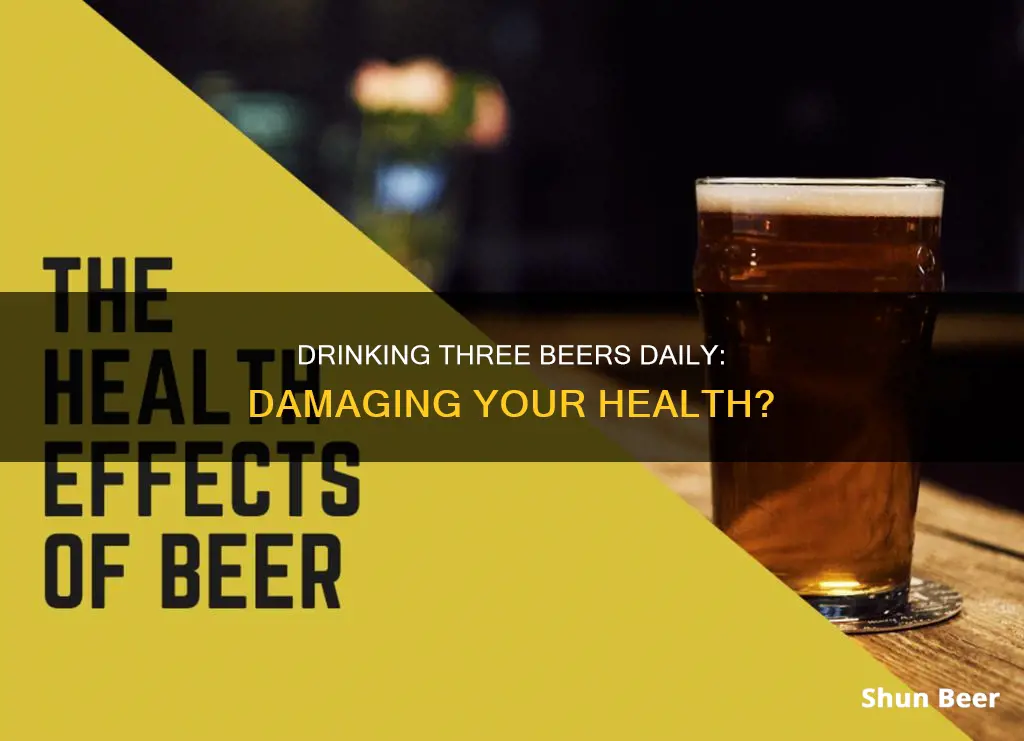
Drinking three beers a day can have significant effects on your health, and it's important to understand the risks involved. Alcohol is a drug, and while moderate drinking is often associated with certain benefits, recent studies suggest that even low levels of alcohol consumption increase the risk of stroke, cancer, and premature death. Excessive drinking, including binge drinking and heavy drinking, can lead to a range of serious health issues, including unintentional injuries, violence, memory problems, dementia, organ damage, chronic diseases such as liver disease and heart disease, gastrointestinal issues, a weakened immune system, and mental health concerns like depression and anxiety. It is also crucial to consider individual factors, as the amount and frequency of alcohol consumption, along with personal characteristics, influence the impact on one's health.
| Characteristics | Values |
|---|---|
| Number of beers considered excessive drinking for men | 5 or more beers in 2 hours or 15 or more beers per week |
| Number of beers considered excessive drinking for women | 4 or more beers in 2 hours or 8 or more beers per week |
| Number of beers considered moderate drinking for men | 1-2 beers per day |
| Number of beers considered moderate drinking for women | 1 beer per day |
| Health consequences of drinking 3 beers a day | Liver damage, inflammation (alcoholic hepatitis), scarring of the liver (cirrhosis), anemia, nerve damage, stomach inflammation, decreased heart function, high blood pressure, stroke, cancer, dementia, etc. |
What You'll Learn

Increased risk of liver disease, heart disease, stroke, high blood pressure, and cancer
Drinking three beers a day can increase your risk of developing chronic diseases such as liver disease, heart disease, stroke, high blood pressure, and cancer.
Liver disease can manifest as inflammation of the liver (alcoholic hepatitis) and may progress to scarring (cirrhosis), which can be life-threatening. Drinking three beers a day over an extended period can also increase your risk of heart-related problems, including decreased heart function and damage to the heart muscle (cardiomyopathy).
Additionally, consuming three beers daily can elevate your risk of experiencing a stroke and developing high blood pressure. This level of alcohol consumption is also associated with an increased risk of several types of cancer.
It's important to note that the risks associated with drinking three beers a day may accumulate over time and may not be immediately apparent. Even if an individual appears to handle their alcohol consumption well, there may still be unseen damage occurring. Therefore, it is advisable to consult a physician for an evaluation if you have concerns about your drinking habits or potential health consequences.
Beer Drinking: Benefits and Limits for Better Health
You may want to see also

Memory and learning problems
Drinking three beers a day can have a significant impact on memory and learning abilities. Alcohol affects the hippocampus, a part of the brain that plays a crucial role in forming and maintaining memories. It disrupts the function of the hippocampus, particularly the neurotransmission of gamma-Aminobutyric acid (GABA) and N-methyl-D-aspartate (NMDA), which are essential for memory formation and long-term potentiation.
The impact of alcohol on the hippocampus leads to difficulties in encoding new memories. This means that while under the influence of alcohol, individuals may struggle to remember new information or events. This phenomenon is known as a "blackout," where people may forget key details or entire periods of time. The likelihood of experiencing blackouts increases with higher alcohol consumption.
Additionally, alcohol has been found to impair working memory, which is essential for performing complex tasks while simultaneously keeping things in mind. It disrupts the central executive function, the visuo-spatial sketchpad, and the phonological loop, which are all components of working memory. This can result in difficulties with attention, inhibition control, and the ability to manipulate information.
Chronic heavy drinking, defined as 21 or more drinks per week for 4 years or more, can lead to long-term memory loss. This is caused by the damaging effects of alcohol on the hippocampus, including the destruction of nerve cells. Thiamine deficiency, commonly seen in heavy drinkers, can also contribute to dementia and permanent memory loss.
However, it is important to note that moderate alcohol consumption, defined as one to two drinks a few days a week, has not been linked to an increased risk of dementia or memory loss.
The effects of alcohol on memory and learning are complex, and while there is significant evidence of impairment, some studies suggest that alcohol may improve the recall of information learned before drinking. This phenomenon, known as "retrograde facilitation," suggests that alcohol may enhance the consolidation of previously learned information.
In summary, drinking three beers a day can impact memory and learning abilities. While moderate consumption may not cause significant harm, heavy and chronic alcohol use can lead to disruptions in memory formation, encoding, and retrieval, as well as long-term memory loss and cognitive decline.
Drinking Beer While Driving in California: What's Allowed?
You may want to see also

Tissue and organ damage
Drinking three beers a day can have detrimental effects on the tissues and organs of the body. Alcohol is a toxin, and when consumed, it goes directly to the liver, which has to prioritise getting rid of it. This can cause permanent damage to the liver, including scarring (cirrhosis) and steatosis, or fatty liver.
The pancreas is also affected by alcohol consumption, which causes it to produce toxic substances that can lead to pancreatitis. This is a dangerous inflammation of the pancreas that results in swelling and pain, impairing its ability to produce the enzymes and hormones necessary for proper digestion.
The small intestine and colon are irritated by alcohol, which can cause abdominal pain, bloating and diarrhoea. Alcohol can also negatively alter the bacteria in the gut, and permeate the lining of the intestine, leading to "leaky gut syndrome". This makes the body more susceptible to alcohol-related diseases, including alcoholic fatty liver disease.
Additionally, alcohol consumption can increase the risk of several types of cancer, including mouth, throat, voice box (larynx), oesophagus, colon, rectum, liver and breast cancer. Even drinking one beer per day can increase a woman's risk of breast cancer by 5-15% compared to non-drinkers.
BeerSmith Compatibility: Apple Devices and Beyond
You may want to see also

Ulcers and gastrointestinal issues
Drinking three beers a day can have a significant impact on the gastrointestinal system, including an increased risk of developing ulcers. While there is no direct causal relationship between alcohol consumption and peptic ulcers, heavy drinking is considered a risk factor. Peptic ulcers are sores that develop in the lower esophagus, stomach lining, or small intestine.
Alcohol can weaken the gastric mucosal barrier, which is the top layer of the stomach lining that keeps gastric acid contained. If this barrier is broken, acid can leak into the surrounding stomach lining or the upper portion of the small intestine, causing it to break or tear, resulting in peptic ulcers. In addition, alcohol can irritate and weaken the stomach lining, causing inflammation (gastritis). If left untreated, gastritis can lead to peptic ulcers and other complications.
For those who already have a stomach ulcer, alcohol consumption can prevent the ulcer from healing and worsen the symptoms. Alcohol can also increase the risk of bleeding ulcers, which can be very dangerous. Research has shown that drinking more than 42 drinks per week increases the risk of a bleeding ulcer fourfold. Therefore, it is recommended that individuals with ulcers abstain from alcohol completely while the ulcer is healing.
In addition to ulcers, heavy alcohol consumption can also cause other gastrointestinal issues. It can lead to decreased absorption of nutrients, a higher risk of acid reflux and gastritis, and an increased risk of certain cancers, such as esophageal and colorectal cancer. Alcohol can also contribute to a "vicious cycle" of difficulties throughout the gastrointestinal tract, including more severe symptoms of inflammatory bowel disease (IBD).
Beer and Bathing: A Safe Soak?
You may want to see also

Higher risk of obesity
Drinking three beers a day can put you at a higher risk of obesity. Beer contains calories, and if you drink several in one sitting, you can end up with a serious calorie overload. A typical beer has 150 calories, and since alcohol calories are easy to overdo, this can lead to weight gain.
Alcohol is a source of recreational energy intake, providing 7 kcal/g, and can contribute to weight gain if not compensated for. Excessive alcohol intake is a leading cause of premature death, and studies have shown that increased energy intake from alcohol can promote a positive energy balance and, ultimately, weight gain. However, the relationship between alcohol consumption and weight gain is complex and influenced by various factors, including drinking patterns, gender, beverage type, and lifestyle.
Beer gets blamed for causing "beer bellies" because the calories are easy to overdo, and the food typically consumed with beer is often fattening. When you drink alcohol, your liver burns alcohol instead of fat. Additionally, alcohol can increase your appetite, leading to increased food intake.
While moderate alcohol consumption may not be associated with weight gain, heavy drinking and binge drinking have been more consistently linked to adiposity and weight gain. Changes in drinking behavior and increased alcohol intake patterns have been associated with weight gain in prospective studies. Therefore, drinking three beers a day can increase your risk of obesity due to the high calorie content of beer and the impact of alcohol on your body's fat-burning processes.
Beer and Dry Lips: A Safe Combo?
You may want to see also
Frequently asked questions
Drinking 3 beers a day does not necessarily constitute alcoholism. However, it is considered "heavy drinking" or "at-risk" drinking, which can lead to alcohol dependence and negative health consequences.
Drinking 3 beers a day can have several negative health effects, including liver damage, increased risk of stroke, high blood pressure, heart disease, cancer, gastrointestinal issues, and weakened immune system.
While moderate drinking may offer some potential health benefits, such as a lower risk of diabetes, heart disease, and Alzheimer's, drinking 3 beers a day is considered excessive and can outweigh these benefits.







